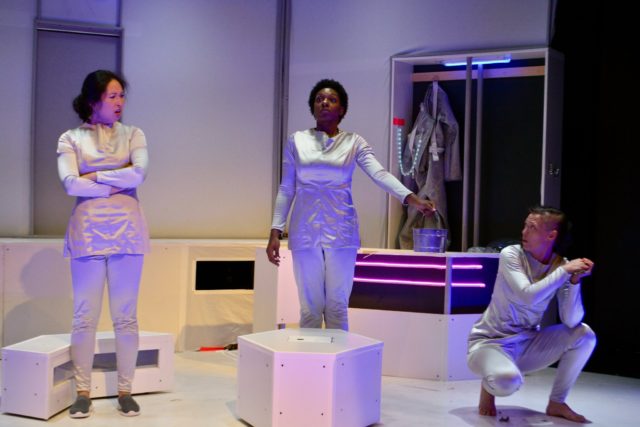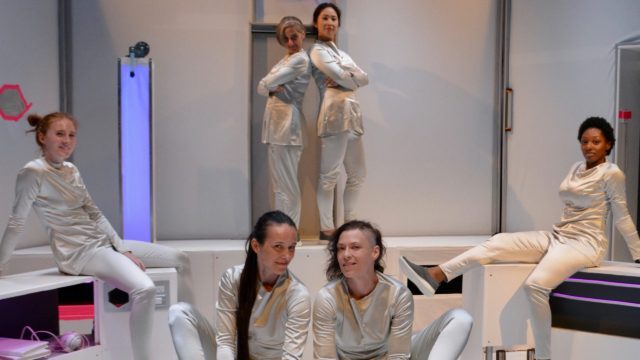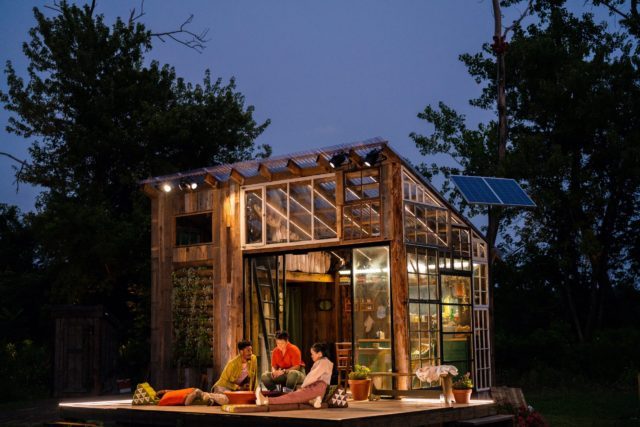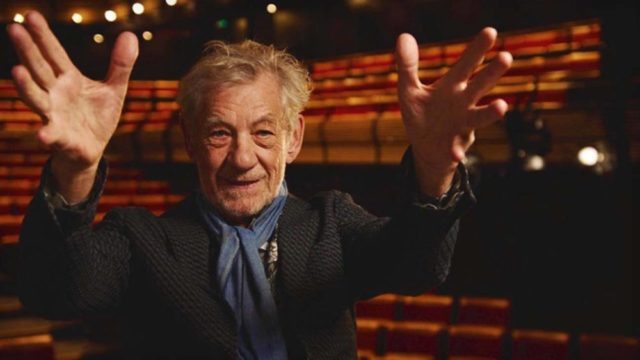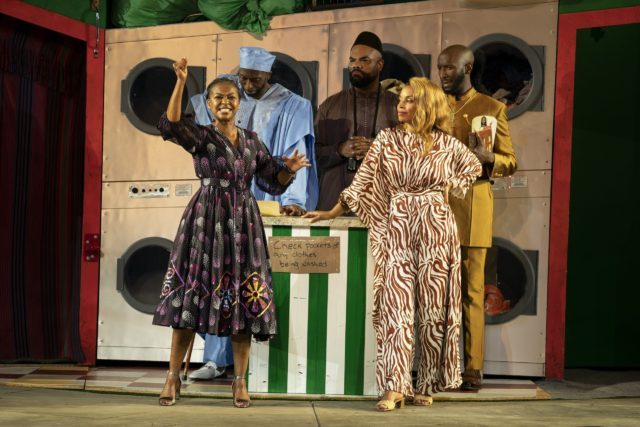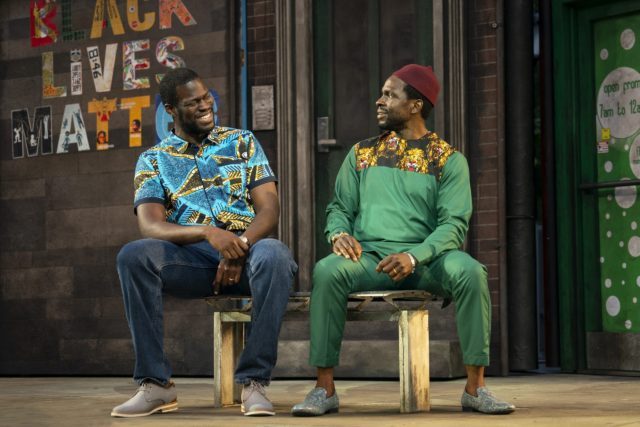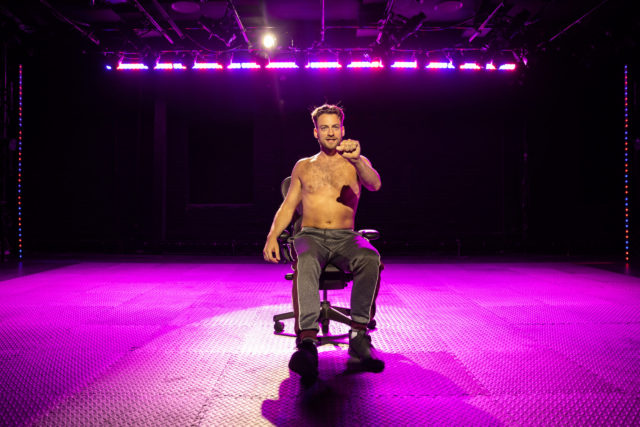
David Gould steers through a treatise on toxic white masculinity in Islander (photo by Maria Baranova)
ISLANDER
HERE Arts Center
145 Sixth Ave. at Dominick St.
Through September 4, $25
212-647-0202
here.org/shows/islander
The New York Islanders ruined an important part of my coming-of-age. Going to high school on Long Island in the 1980s was not a home-ice advantage for true-blue Rangers fans. The Fish Sticks dynasty was shortly followed by the early, unexpected death of my father — who, I’m ashamed to admit, was one of those inexplicable people who rooted for both teams — making a bad time even worse. Although I don’t blame the Islanders for his passing, I see it as the culmination of a hellish nightmare that still haunts me today.
So the prospect of watching a play built around the Islanders’ disastrous 2017–18 season filled me with so much hope and joy that I wore my Mark Messier captain’s jersey to the show, Islander, which runs at HERE Arts Center through September 4. It didn’t even bother me that the Rangers actually finished below the Islanders that year, coming in last in the Metropolitan Division by a single but harrowing point.
However, I was soon to learn — after the singing of “The Star-Spangled Banner,” for which I was the only one standing — that the seventy-five-minute play is not really about hockey but is instead a thinly disguised treatise on toxic white masculinity that never mentions the sport and doesn’t bring up the last name of the key player and team or even use such terminology as “stick,” “puck,” and “neutral zone” till the end, when the protagonist (David Gould) is joined by an older fan (Dick Toth) and a young child (Aksel Latham-Mitchell) embodying that star player.
Gould, portraying a fictional amalgamation of Islanders players structured mostly around goaltender Jaroslav Halák, declares early on, “You can feel my breathing / you can feel my excitement / rough transitions through the decades / half-empty promises / a twenty-three-year-long drought / getting endlessly pushed around by my crosstown rivals / worst of all, I had to say goodbye to my home of forty-three years / forced out / some friends abandoned ship / and those that remained were tried, time and time again — / My friends have been through a lot / Life as my friend hasn’t been easy.”
The dialogue has been taken verbatim from television and radio broadcasts, interviews, blog posts, and podcasts but stripped of its hockey specificity, so it comes across as a privileged white man who believes he deserves to be successful, that it’s in his blood. “I’m good, I’m good. I’m exciting. I’m . . . sure, I’m a little bit lucky but I tend to look at luck as a surface level,” he tells us. “I’m the benefactor of the, of last . . . there’s a little bit of luck. But if you’re a good guy, you’re gonna create your own luck. Looking back on when I was bad, you could be like: oh, he’s a little unlucky. Because I was bad, you know? But like . . . so bad guys tend to do stuff . . . like that . . . but. I think I’m good. The system the . . . system is definitely working. Which is nice.” The “system” is not so much the Islanders’ method of play but the systemic problems in society that impact race, gender, and income inequality. When he adds, “Good is the enemy of great. No more good; it’s time to be great. Watch me,” he sounds like a finance bro determined to rake in mounds of cash.
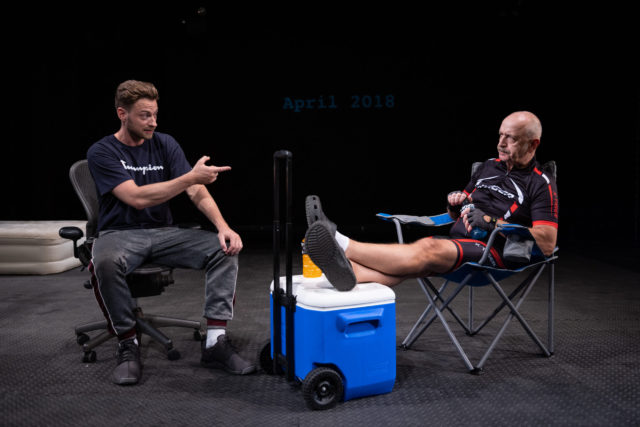
An unnamed man (David Gould) and a fan (Dick Toth) talk hockey in Islander (photo by Maria Baranova)
You don’t have to understand anything about hockey to get the show, but it might help to know that the 2017–18 campaign was the Islanders’ third season at Barclays Center in Brooklyn; they had skated at Nassau Coliseum in Uniondale from their inaugural 1972–73 season through 2014–15 before moving back temporarily in 2018. The “John” referred to in the play is captain and team star John Tavares, who will become a free agent after that season. And hockey is by far the least diverse of the major sports, with very few people of color on the ice, behind the bench, or in the front office. The title, Islander, is as much a sly reference to colonialism as it is to hockey.
Compiled by Liza Birkenmeier and directed by Katie Brook, who previously collaborated on the terrific Dr. Ride’s American Beach House, and presented by Televiolet and New Georges, the show works best when Gould is directly addressing the audience and expounding on his abilities. “I need to come out on top. There’s no way around it. I need to come out on top,” he declares. He takes off his shirt to reveal his relatively hot bod, whispers confusing self-affirmations into a microphone in front of a mirror, performs interpretive movements that are more like ice dancing than hockey, and sits down with a fan and talks turkey over a cooler.
Once the narrative turns its attention to the details of hockey, it loses its flow and suddenly becomes about something specific instead of being a more abstract study of white male fragility. It’s like the power play is over and now the team is skating with a wing in the penalty box. As the fan explains, “I know exactly what you’re talking about. No one else does.” The spare set design — I’m still trying to figure out why a mattress was brought onstage — and lighting are by Josh Smith, with choreography by Katie Rose McLaughlin and sound by Ben Williams. Projections on the back screen keep track of the month of the season and ask such questions as “Do you believe that performance matters?,” “What do you think of natural selection?,” and “Have you ever been blindsided?,” the last being a hockey term for being caught unawares by a heavy body check.
“I think I’m the only one who understands the enormity of this historical moment,” the man says, adding later, “Why can’t I just win.” We are now in the midst of an enormous historical moment, one in which white men are not going to win like they used to. Islander is having a good season, better than the Islanders had in 2017–18, although it might not go far in the playoffs. Seating for the show at HERE is half capacity, so it should feel like a real Islanders game. The Islanders’ 2021–22 hockey season kicks off October 14, with the first thirteen games on the road before they christen the brand-new UBS Arena in Elmont with a home contest against Calgary on November 20. I do not wish them well.
